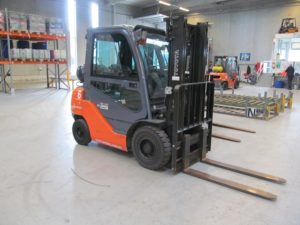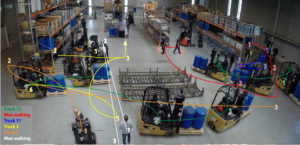Forklift driver training and certification
Dennis Day, Kristian Mortensen, Maurice Nevile, and Johannes Wagner
 This project involves collaboration with a local forklift training school, and explores how drivers of different levels of knowledge and experience are instructed and learn to drive forklift trucks in a simulated warehouse environment.
This project involves collaboration with a local forklift training school, and explores how drivers of different levels of knowledge and experience are instructed and learn to drive forklift trucks in a simulated warehouse environment.
Areas of interest include:
- how drivers give warnings about presence and movement as trucks pass one another
- how instructors describe loads and how they should be lifted and moved
This collective project deals with the boundaries between body and objects, and how people can acquire so strikingly elaborated skills in using objects such that the borders of the body expand. Gregory Bateson (1973: 318) gives an example in his book Steps to an Ecology of Mind: “Consider a blind man with a stick. Where does the blind man’s self begin? At the tip of the stick? At the act of the stick? Or that some points halfway up the stick? ”
The Forklift project attempts to understand how bodily skills in using complicated machinery are built by learning to drive a forklift.
 The project has been allowed to video record a complete training course for forklift operators at the Kolding AMU center. The project installed 15 cameras in the learning environment following three specific trucks with footage from several angles inside and outside of the trucks. The data cover 82 hours of forklift driving. The different camera angles are integrated into one video stream but each camera angle can be accessed individually. In collaboration with TALKBANK at Carnegie Mellon University in Pittsburgh, SOIL has developed features where transcriptions can switch between different camera angles, a feature that hadn’t been added previously to any other transcription software.
The project has been allowed to video record a complete training course for forklift operators at the Kolding AMU center. The project installed 15 cameras in the learning environment following three specific trucks with footage from several angles inside and outside of the trucks. The data cover 82 hours of forklift driving. The different camera angles are integrated into one video stream but each camera angle can be accessed individually. In collaboration with TALKBANK at Carnegie Mellon University in Pittsburgh, SOIL has developed features where transcriptions can switch between different camera angles, a feature that hadn’t been added previously to any other transcription software.
After having spent half a year to edit and sync the video material, the project groups is now going to look at how truck operators learn to handle forklifts, how they get the feeling of how deep the load is, how high the fork is raised, etc. The project focuses on a type of learning that – unlike much school-based learning – is concerned with procedural knowledge, i.e. in the ways operators build body-based skills and competencies. The forklift project cooperates intensely with researchers from SDUDesign and collaborates with CROWN, an US forklift producer, about design and development of future forklifts.
Johannes Wagner presented the project at the yearly conference of Danish forklift teachers in August 2014. Kristian Mortensen and Johannes Wagner presented a paper on skill learning at a conference in Groningen, The Netherlands, in 2015, arranged a workshop in New Bremen, Ohio, and are currently writing an invited chapter about skill learning. Further papers are currently written by Day, Mortensen & Hazel; Day & Wagner, Nevile & Wagner; and Nevile.